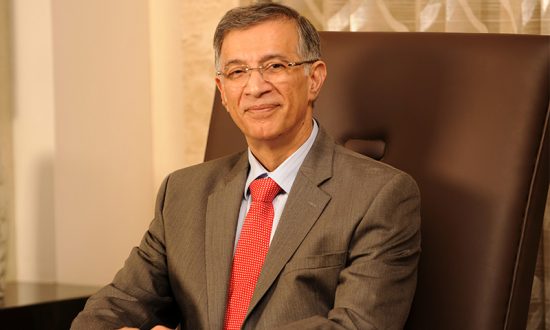The importance of academic excellence in the making of a highly successful first-generation business entrepreneur is perhaps best personified by Dr. Niranjan Hiranandani. As a student, he had the distinction of standing Second during his graduation from Mumbai University in his Bachelor of Commerce Degree (Hons.). This was followed by completing F.C.A. from the Institute of Chartered Accountants of India. Adding a new dimension to his versatile personality, it truly befits the new role of academician for one who started his career as a teacher to the students learning Chartered Accountancy. Over the years, he has set up the Hiranandani Foundation School, successfully run the academic institutions of the HSNC Board – it is only in the fitness of things that his wish to go further and become an educationist comes true as Provost of the newly set up HSNC University in Mumbai. Excellence was not confined just to his studies. As the ‘Developer extraordinaire’ as also ‘the one who redefined the skyline of Mumbai’, he has evolved into not just an industry leader, but also an Industry Knowledge Guru.
The NEP 2020 policy has been a path-breaking step to ensure an advanced and imaginative teaching pedagogy for students across the nation. It has transformed the redundant Indian educational system, in which the Covid-19 pandemic played an influential role to accelerate it further. The use of technology in the teaching-learning process, especially during the pandemic has acted as a catalyst for the dawn of the ‘digital era’ in the education sector. The new policy is aimed to bridge the gap between skill, academics, and industry know-how. India is a land of entrepreneurship where due recognition to vocational training & skill development needs to be unleashed.
With the advancement of globalization, the ‘new-age’ careers emerge as economic cogwheels for GDP, Employment, and Nation building. The ‘new-normal’ needs a new vision, new roadmap, and new trends in the education landscape. The era of globalization witnesses see-through changes in modern careers choices & educational pedagogies.
As human-technology relation grows further, new educational developments continue to evolve as follows:
- Soft skill centricity
Soft skills are picking up the steam amongst the learner and teacher due to its application in real-world pursuits. Direct outcomes of these skills may not be measurable, but they are concealed beneath academic accomplishments. These skills shape students’ identity, primarily as an individual and recognized professional.
Human-centric skills are also skimming up with the rise of artificial intelligence in the modern workplace. Often underrated, building human-centric design thinking is crucial for personalized and professional learning. Assessing soft skills in a digitally nimble ecosystem will be imperative for the balanced approach in a critically diverse situation. Soft skills like critical thinking, complex problem solving, resilience, agility, creativity, emotional intelligence will see rising prominence in the age of automation where technology cannot replace such skills.
- The era of Ed-tech
The EdTech sector has been growing considerably even since the Covid-19 struck the globe. The platform caters to a wide range of learners, right from school students to continuous learners looking to reskill and up-skill themselves. Features like personalized and flexible learning have enabled the creation of individual learning methodologies to cater to multilateral requirements. As the trend of hybrid learning is irreversible, EdTech platforms are the new future of the education landscape.
- Interdisciplinary and Multidisciplinary learning
Blended learning has surfaced as one of the ‘new-age’ learning methodologies around the world. At a higher educational level, interdisciplinary learning is even more crucial, as it requires the knowledge bank of various fields and streams to excel in today’s futuristic career paths. Interdisciplinary knowledge and application of different disciplines will lead to greater creativity among human capital.
Multiple entry-exit and credit-based choice learning forms an integral part of new learning syllabi. Interdisciplinary and blended learning can revolutionize the education system globally by fostering freedom of choice for learners so that they no longer have to leave behind one for the other. These learning methodologies will enrich your understanding of the world by deepening your knowledge base and broadening your perspective in the era of globalization.
- Critical and design thinking
Design thinking along with critical thinking strengthens the innovation to augment consumer-centric solutions. This is a key driver for creating opportunities with its universal application across various industries and sectors. If used effectively, critical thinking can help us acquire key insights about the user experience and strengthen our design competency. A fine blend between critical and design thinking will nudge us to derive at a human-centric approach. New learning should encourage ways of thinking to develop better thinking capabilities and accentuate complex problem-solving skill sets.
The roadmap of the Indian education sector in the coming year 2022, will witness a huge transformation with better and thoughtful approaches towards raising a generation of learners inclined towards creating a better world. The new pedagogies will include innovative tools, techniques and skill-sets to better prepare our learners to blend into the real world of working professionals. In order to do so, a constant process of learning and questioning is imperative to improve the world.




